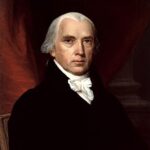The Hartford Convention Crisis
President James Madison faced unprecedented internal opposition during the War of 1812. ⚠️ New England Federalists despised his military policies and economic restrictions. Maritime trade had collapsed under British blockades and Madison’s embargo policies. The Hartford Convention assembled in December 1814 as desperate Federalists sought solutions.
Federalist Opposition Grows
Massachusetts, Connecticut, and Rhode Island delegates gathered in Hartford, Connecticut. They discussed constitutional amendments to limit Republican power. Some radical members even proposed New England’s secession from the Union. 📊 The region’s economy had suffered devastating losses from trade disruptions. Madison’s war seemed unwinnable to many New Englanders.
Constitutional Demands
Convention delegates drafted seven constitutional amendments targeting Republican policies. They wanted to eliminate the three-fifths compromise for slave representation. 💰 Trade restrictions would require two-thirds congressional approval under their proposals. The amendments aimed to restore Federalist political influence in national affairs. These demands represented the most serious constitutional crisis since ratification.
Impact:
Political Consequences
The Hartford Convention severely damaged Federalist Party credibility nationwide. 📉 News of the Treaty of Ghent arrived just as delegates presented their demands. Andrew Jackson’s victory at New Orleans made Federalists appear unpatriotic and treasonous. The party never recovered from accusations of wartime disloyalty.
Constitutional Precedent
The convention established dangerous precedents for state opposition to federal authority. 🔥 Future sectional crises would reference Hartford’s example of organized resistance. South Carolina’s nullification crisis directly borrowed from Federalist arguments. The event demonstrated how regional interests could threaten national unity.
Long-term National Effects
Madison’s presidency survived its greatest internal challenge through military success. The Hartford Convention’s failure strengthened federal authority over state dissent. 🌍 International observers noted America’s internal divisions during wartime. However, the crisis ultimately reinforced the principle that states cannot unilaterally oppose federal policy. The Federalist Party’s collapse left Republicans dominant for decades.
